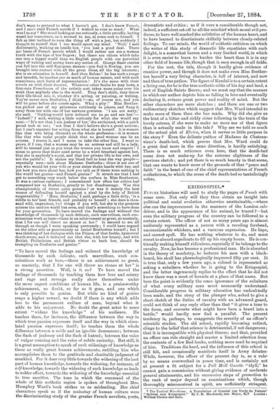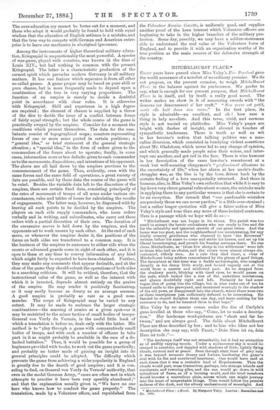KRIE G S SPIEL.* FUTURE historians will need to study
the pages of Punch with some care. Not only will they thus obtain an insight into political and social evolution otherwise unattainable,—where else can the improvement in the manners of the London cab- driver, and in the appearance of his animal, be traced ?—but even the military progress of the country can be followed to a certain extent. The officer of not so many years ago is almost uniformly represented as a person with a receding forehead, unconscionable whiskers, and a vacuous expression. He lisps, and cannot spell. He has nothing whatever to do, and must resort to absurd expedients to fill up his empty hours. He is con- tinually making himself ridiculous, especially if he belongs to the cavalry. Now, he has become a professional man. He is absorbed in the theory of musketry, he lectures his men with a black- board, his skull has phrenologically improved fifty per cent. It is true that, only a few years ago, a colonel is represented as asking a subaltern, whether he is going to the Kriegsspiel, and the latter ingenuously replies to the effect that he did not know there was a meet of hounds at a place of that name. But here the point is evidently the crass ignorance of the subaltern of what every military man must necessarily understand- Considerable progress in military education has undoubtedly been made, and the story of the plunger who, asked to give a short sketch of the duties of cavalry with an advanced guard, could not think of any reply other than that " it gives a tone to the force, and converts what might have been a brawl into a battle," would hardly now find a parallel. The present tendency is, perhaps, to exaggerate the severity of an officer's scientific studies. The old school, rapidly becoming extinct, clings to the belief that science is detrimental, if not dangerous ; that it is incompatible with physical fitness; and that, provided an officer can ride straight and master a limited selection from the contents of a few Red-books, nothing more need be required of him. Traditions die hard, and the influence of this school is still felt, and occasionally manifests itself in Army debates- While, however, the officer of the present day is, as a rule' by no means overworked in peace time, and is certainly not at present a fit subject for a Pall Mall Gazelle "idyll," he cannot gain a commission without giving evidence of moderate general attainments, and his successive steps of promotion to the rank of major depend on examinations which, though thoroughly misconceived in spirit, are sufficiently stringent.
• The Tactical War-Game. A Translation of General von Verdy da Vernols' " Beitrag sum Kriegsspiel." By d. R. MacdoneU, late Major, R.V London : William Clowes and Bone.
The over-education cry cannot be borne out for a moment, and those who adopt it would probably be found to hold with equal wisdom that the education of English artisans is a mistake, and that the true way to compete with German and American enter- prise is to leave our mechanics in aboriginal ignorance.
Among the instruments of higher theoretical military educa- tion, Kriegsspiel is unquestionably the moat powerful. A species of war-game, played with counters, was known in the time of Louis XIV., but had nothing in common with the present KriegsspieL The latter is a characteristic production of the earnest spirit which pervades modern Germany in all military matters. It has one feature which separates it from all other so-called games. A game proper may be based on pure skill or pure chance, but is more frequently made to depend upon a combination of the two in very varying proportions. The function of an umpire is merely to decide a doubtful point in accordance with clear rules. It is otherwise with Kriegsspiel. Skill and experience in a high degree are required ; the element of chance is supplied by a throw of the dice to decide the issue of a conflict between forces of fairly equal strength ; but the whole course of the game is practically swayed by the umpires. Consider for a moment the conditions which present themselves. The data for the com- batants consist of topographical maps ; counters representing forces of one or more arms posted in certain positions ; a "general idea," or brief statement of the general strategic situation ; a " special idea," in the form of orders given to the commanders of the forces about to operate; finally, in some cases, information more or less definite given to each commander as to the movements, dispositions, and intentions of his opponent. The above are all laid down by the umpires previous to the commencement of the game. Thus, evidently, even with the same forces and the same field of operations, a great variety of data are possible, and by these data the course of the game will be ruled. Besides the variable data left to the discretion of the umpires, there are certain fixed data, consisting principally of the rates of movement of troops of all arms under various cir- cumstances, rules and tables of losses for calculating the results of engagements. The latter may, however, be dispensed with by leaving all such points to be decided by the umpires. The players on each side supply commanders, who issue orders verbally and in writing, and subordinates, who carry out these orders with a partial discretion of their own. The duration of the successive moves is laid down by the umpires, and the opponents set to work unseen by each other. At the end of each move, or whenever the umpires desire it, the positions of the forces on both sides are transferred to a common map. It is the business of the umpires to announce to either side when the scouts or advanced guards come in sight of each other, and it is open to them at any time to convey information of any kind which might fairly be expected to have been obtained. Further, they may make any comments that appear desirable, and at the close of the game they should submit the operations of both sides to a searching criticism. It will be evident, therefore, that the instructional value of the game, as well as the interest with which it is invested, depends almost entirely on the genius of the umpire. He may render it positively fascinating, or it may easily become as dreary as an average sermon. A good umpire is probably as rare as a good com- mander. The scope of Kriegsspiel may be varied to any extent. It may be made to embrace the larger strategic combinations—the massing of armies at a given spot—or it may be restricted to the minor tactics of small bodies of troops. General von Verdy du Vernois, in the useful little book of which a translation is before us, deals only with the latter. His method is to "play through a game with comparatively small bodies of troops, and with such a number of officers to take part in it as might probably be available in the case of a de- tached battalion." Thus, it would be possible for a group of beginners provided with books, to work out the game practically; and probably no better mode of gaining an insight into its general principles could be adopted. The difficulty which prevents the game from achieving a wider popularity in England is greatly due to the dearth of good umpires ; and it is con- soling to find, on General von Verdy du Vernois' authority, that even in the model German Army, "cases are often met in which attempts to practise it have been very speedily abandoned and that the explanation usually given is, " We have no one here who knows how to conduct the game properly." The translation, made by a Volunteer officer, and republished from the Volunteer Service Gazette, is uniformly good, and supplies another proof of the keen interest which Volunteer officers are beginning to take in the higher branches of the military pro- fession. Some day, possibly, we may have a soldier-statesman able to understand the real value of the Volunteer force of England, and to provide it with an organisation worthy of its true position as the main reserve of the defensive strength of the country.



































 Previous page
Previous page